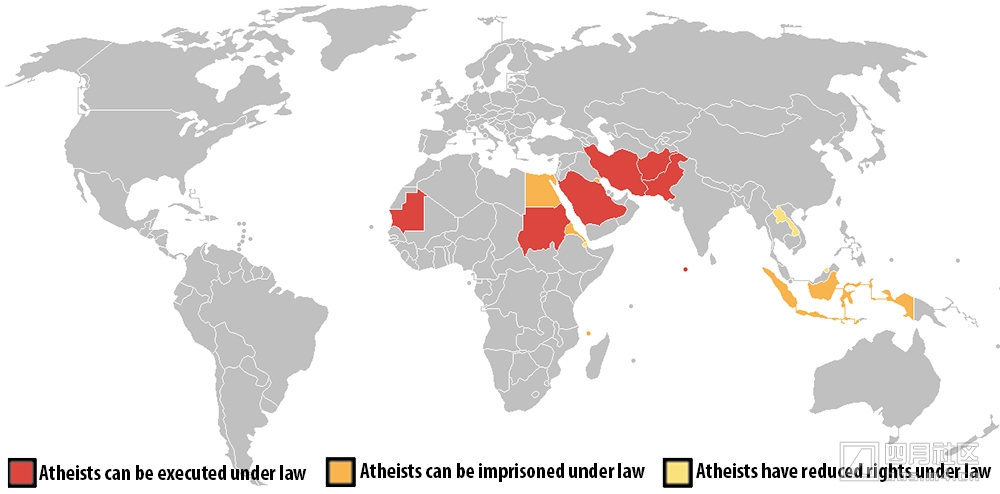本帖最后由 下个月 于 2014-6-12 13:07 编辑
【中文标题】七个无神论者可以被处死的国家
【原文标题】The seven countries where the state can execute you for being atheist
【登载媒体】The Washington Post
【原文作者】Max Fisher

The annual "freedom of thought" report from the International Humanist and Ethical Union, an advocacy umbrella group that represents and seeks to protect non-religious people, details laws and practices around the world that punish or restrict atheism. The group presented the report to the United Nations today.
国际人道和伦理联合会是一个旨在代表和保护无宗教信仰人士的倡导、庇护组织。在其题为“思想自由”的年度报告中,该组织详尽介绍了世界范围内处罚或限制无神论的法律与实践。今天,国际人道和伦理联合会向联合国做了报告演讲。
The report tracks, among other things, which countries have laws explicitly targeting atheists. There are not many, but the states that forbid non-religiousness – typically as part of "anti-blasphemy" legislation – include seven nations where atheism is punishable by death. All seven establish Islam as the state religion. Though that list includes some dictatorships, the country that appears to most frequently condemn atheists to death for their beliefs is actually a democracy, if a frail one: Pakistan. Others include Saudi Arabia, Iran, Afghanistan, Sudan, the West African state of Mauritania, and the Maldives, an island nation in the Indian Ocean. These countries are colored red on the above map.
在众多限制无神论的实践中,这份报告主要追踪了那些法律明确把矛头指向无神论者的国家。这样的国家并不多,但是在这些以立法形式反对无宗教的国家之中(多数是“反亵渎”的立法),有七个因无神论可判处死刑的国家。所有这七个国家均将伊斯兰教奉为国教。尽管有些国家是独裁国家,但那个最经常谴责无神论者并为了他们的信仰而处死无神论者的国家,其实是个民主国家,如果说是个孱弱的民主国家的话:巴基斯坦。其它国家包括,沙特阿拉伯,伊朗,阿富汗,苏丹,西非的毛里塔尼亚,以及印度洋岛国马尔代夫。这些国家在上面的地图中被标记为红色。
Earlier this year, a 23-year-old Saudi man named Hamza Kashgari tweeted in commemoration of the Prophet Mohammed's birthday that, while he found the Islamic holy man inspirational, he did not believe in his divinity. When Kashgari was accused of blasphemy, he attempted to flee the country for his life, it turns out rightly. He was arrested while changing flights in Malaysia, deported back to Saudi Arabia, and is now awaiting charges that could include his execution for blasphemy and atheism.
今年早些时候,Hamza Kashgari,一个23岁的沙特阿拉伯人,在推特上纪念先知默罕默德的生日。尽管他认为这位伊斯兰教的圣人给予他很多启示,但他并不认为先知默罕默德是神。当Kashgari被指控亵渎先知默罕默德的时候,他尝试逃离这个国家以挽救自己的生命。这种指控在当地是正当的。他在马来西亚转机时被逮捕,并被驱逐出境送回沙特阿拉伯。现在,他在等待对他的控诉,包括也许会因为亵渎和无神论而被处死的控诉。
Though atheists are rarely handed death sentences in these countries, the threat of punishment can stifle religious freedom. As this interview with an atheist in Saudi Arabia showed, the laws have a chilling effect, enforcing cultural taboos against atheism and pushing non-religious citizens to keep their beliefs secret out of fear of retaliation.
尽管无神论者在这些国家很少被判处死刑,但处罚的威胁会抑制宗教自由。如同在与一位来自沙特阿拉伯无神论者的访谈中揭示的,强制施行反对无神论的文化禁令和处罚无宗教信仰人士的消极影响在于,这会让无神论者因为惧怕报复而不敢把无神论的信仰公开。
Some countries, according to the report, also codify possible prison sentences for atheists (these countries are indicated in orange on the map). These laws, however, can be difficult to distinguish from restrictions against "religious incitement," which are common in much of the world, including in atheist-friendly Western Europe. But the report indicates that, in countries such as Egypt or Indonesia, the laws appear to be used to specifically target citizens who, for example, publicly profess their own atheism.
报告显示,有些国家也通过制定法律囚禁无神论(这些国家在地图中以橘黄色标示)。然而,这些法律很难与那些世界上常见的反“宗教煽动”的限制相区分,包括在对无神论者十分宽容的西欧。但这份报告显示,在实践中,有些国家的法律将矛头指向公开宣称自己是无神论者的人,比如埃及和印度尼西亚。
Other countries, colored yellow on the map, restrict rights for atheists, for example by limiting marriage rights or public service.
其它在地图中标记为黄色的国家,对无神论者的权利进行限制。比如,限制结婚权和从事公共服务的权利。
The United Nations special rapporteur on freedom of religion or belief Heiner Bielefeldt accepted the report, according to Reuters, noting that there is little global awareness that atheism is protected by international human rights law.
联合国宗教与信仰自由特别报告员Heiner Bielefeldt接收了这份报告,据路透社报道,在世界范围内几乎没有人知道无神论是受到国际人权法保护的。
补充内容 (2014-6-12 16:35):
【原文链接】http://www.washingtonpost.com/blogs/worldviews/wp/2012/12/10/the-seven-countries-where-the-state-can-execute-you-for-being-atheist/ | 